You Decide: Sept. 27 Republican debate analysis
2nd Republican debate analysis
John Hook was joined by two of the Valley's premier political consultants, HighGround Inc..'s Chuck Coughlin, and Copper State Consulting Group's Stan Barnes. They broke down key moments in the debate.
PHOENIX - Right after Wednesday's Republican debate, FOX 10 hosted our first-ever streaming event at 8 p.m. MST Arizona time (11 p.m. Eastern).
John Hook was joined by two of the Valley's premier political consultants, HighGround Inc..'s Chuck Coughlin, and Copper State Consulting Group's Stan Barnes. They broke down key moments in the debate: Who won? Who lost? What's next? And which candidate is in the best position to take on Donald Trump.
Here's what you need to know about the candidates who participated in the debate:
Doug Burgum
- Born August 1, 1956 in Arthur, North Dakota
- North Dakota governor
- Founded a software company that was sold to Microsoft in 2001
- Endorsed Donald Trump in 2016 and 2020
- Signed a near-total ban on abortion in North Dakota
- Sent National Guard troops to the southern border
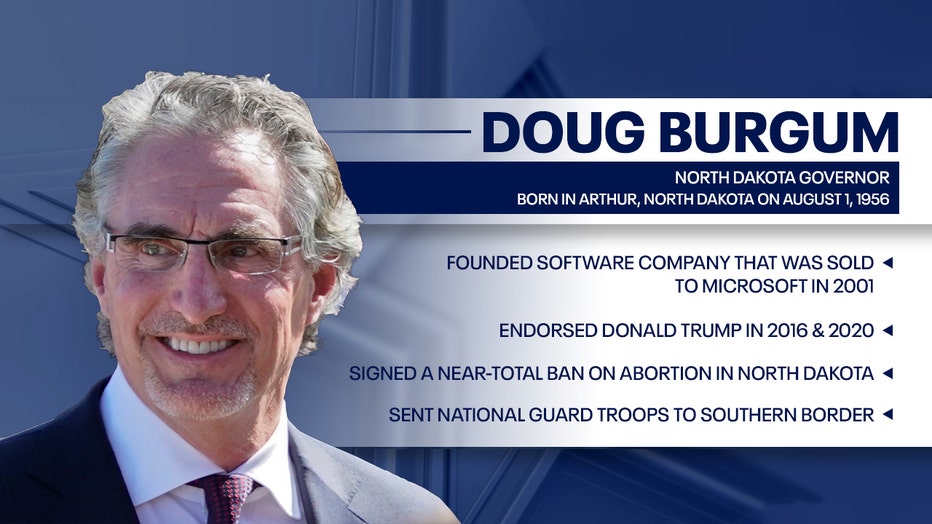
Burgum, a former software entrepreneur now in his second term as North Dakota’s governor, nearly missed the first debate due to a tendon injury sustained while playing basketball with his campaign staff. But Burgum still participated, telling reporters afterward that he stood on one leg behind the podium.
Burgum has been using his fortune to boost his campaign, giving away $20 gift cards — "Biden Relief Cards," hitting Biden’s handling of the economy — in exchange for $1 donations. Critics have questioned whether the offer violates campaign finance law.
Chris Christie
- Born in Newark, New Jersey on September 6, 1962
- Former New Jersey governor
- Anti-Trump Republican
- Calls the former president a coward for not taking part in debates
- Slammed Ron DeSantis for failing to meet with President Joe Biden during tour of Hurricane Idalia damage
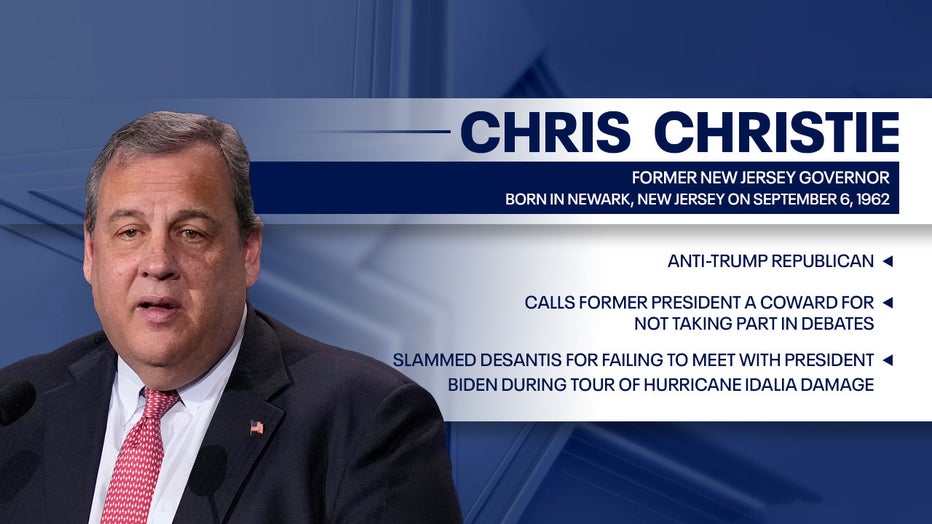
The former New Jersey governor opened his campaign by portraying himself as the only candidate ready to take on Trump, calling on the former president to "show up at the debates and defend his record."
Without Trump at the first debate, Christie was left without his primary intended target. At times, he was drowned out by the audience’s boos as he pushed back aggressively on questioning as to whether the candidates would support Trump even if he is convicted of felony charges.
Ron DeSantis
- Born in Jacksonville, Florida on Sept. 14, 1978
- Florida governor
- Closest rival to Donald Trump
- Says Trump unlikely to be reelected if convicted of criminal charges
- Says he would not fund COVID-19 booster vaccines if elected and supports ‘anti-woke’ policies
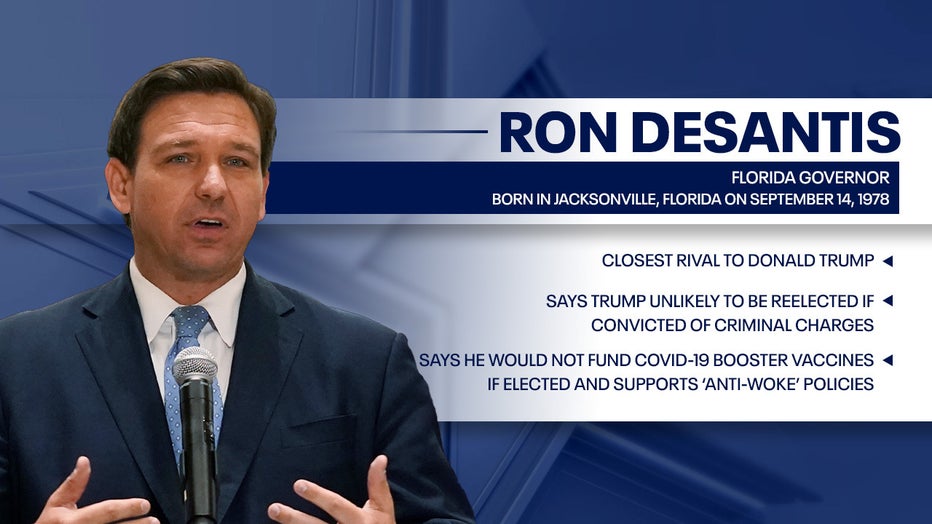
The Florida governor had long been seen as the top rival for Trump, finishing a distant second to the current GOP front-runner in both early-voting state and national polls, and raising an impressive amount of money.
But those sands have begun to shift as DeSantis’ effort has struggled to live up to high expectations for his campaign. Republican support for him nationally has slipped substantially from its high point earlier this year.
>> 7 candidates have qualified for the second GOP presidential debate. Here’s who missed the cut
Nikki Haley
- Born in Bamberg, South Carolina on January 20, 1972
- Former U.N. Ambassador and former South Carolina governor
- Supports policies that strengthen parental involvement and decision-making in schools
- Says middle-class and small businesses deserve better than 'Bidenomics"
- Recent polling suggests she's the strongest GOP candidate in a match-up against President Biden
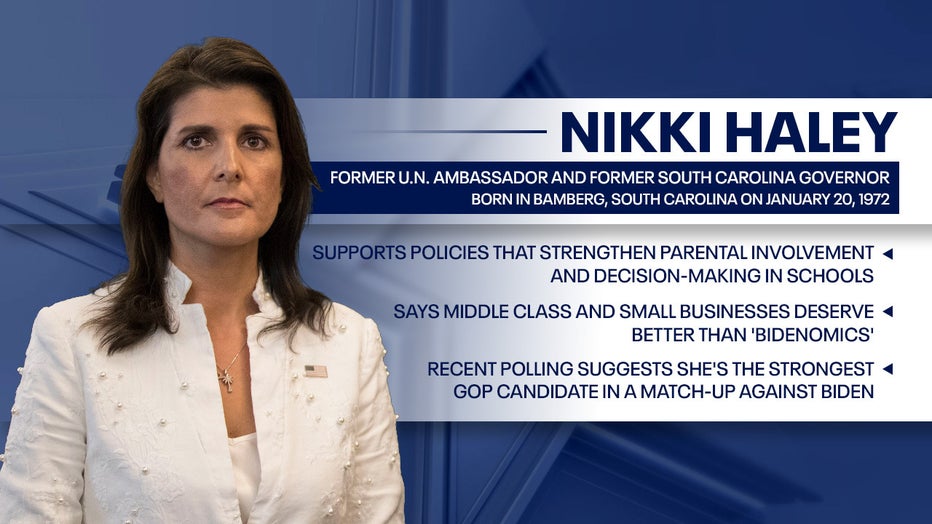
The only Republican woman on stage — and in the field — Haley experienced a fundraising bounce after her performance in the first debate. Her campaign said she raised at least $1 million in 72 hours, a record period for her.
Two recent polls of her home state of South Carolina found that Haley — a former United Nations ambassador and South Carolina governor — was in second place, well behind Trump but slightly ahead of other GOP rivals.
During one squabble in the first GOP debate, Haley cut in with a reference to a famous line from Margaret Thatcher, Britain’s first female prime minister: "If you want something said, ask a man. If you want something done, ask a woman."
Mike Pence
- Born June 7, 1959 in Columbus, Indiana
- Former Vice President and former Indiana governor
- Supports a federal ban on abortion at six weeks
- Says runaway spending and debt are driving inflation
- Says Biden has ‘made every American abroad less safe’ after Iran prisoner swap deal
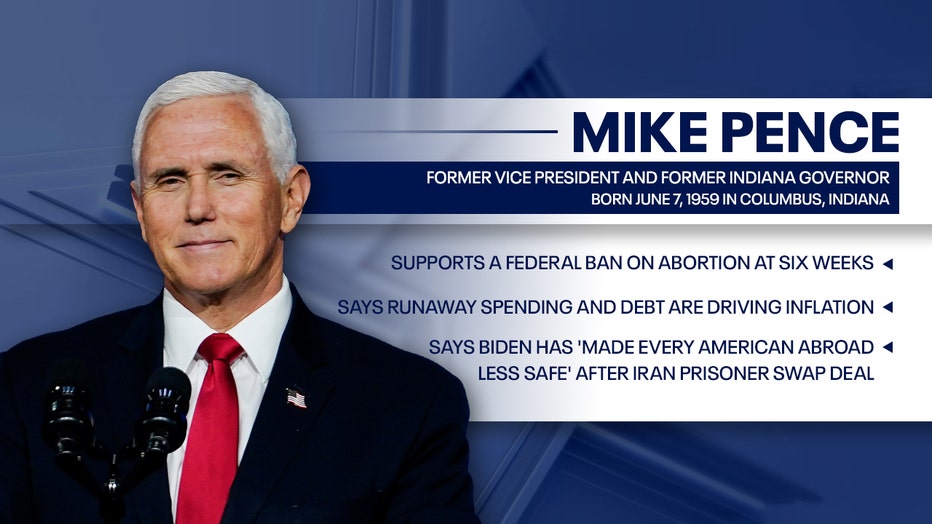
Campaigning on his reputation as a statesman and experienced elected official, Trump’s vice president showed off his debate chops last month and is angling to see more action in California.
Pence had combative moments with several other candidates in Milwaukee over some of the biggest dividing lines in the Republican nominating contest.
Drawing a contrast with Haley over abortion, among his signature issues, Pence called Haley’s push for consensus over the issue "the opposite of leadership." Perhaps some of Pence’s fieriest moments came as he sparred with Ramaswamy, saying, "Now is not the time for on-the-job training."
Pence himself was also the subject of a pivotal debate question, with the candidates largely agreeing that he had been correct to protect the results of the 2020 election against Trump’s pressure campaign.
>> Second GOP primary debate: A look at the net worth, backgrounds of top candidates
Vivek Ramaswamy
- Born August 9, 1985 in Cincinnati, Ohio
- Biotech entrepreneur and political commentator
- Calls the ‘climate change agenda’ a hoax
- Criticized Trump for failing to repeal Obamacare
- Seeks to ‘declare independence from communist China’
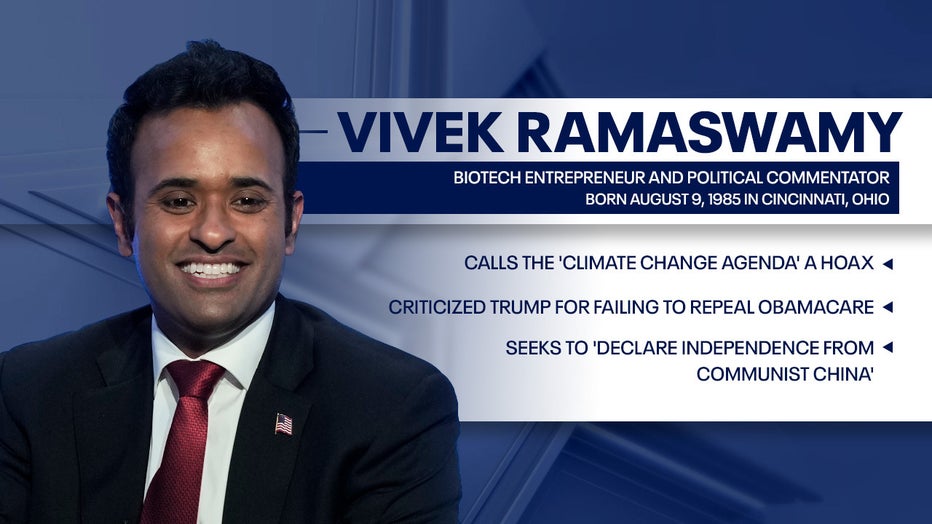
The political newcomer scored several memorable moments at the first debate, criticizing some rivals as "super PAC puppets" who were using "ready-made, preprepared slogans" to attack him. He was a frequent target of incoming attacks on his lack of experience.
Those jabs helped boost both Ramaswamy’s campaign coffers and his name ID in the broad Republican field.
Tim Scott
- Born September 19, 1965 in North Charleston, South Carolina
- South Carolina senator
- Seeks to reduce government spending
- Supports federal ban on abortion after 15 weeks of pregnancy
- Only Black Republican in the U.S. Senate
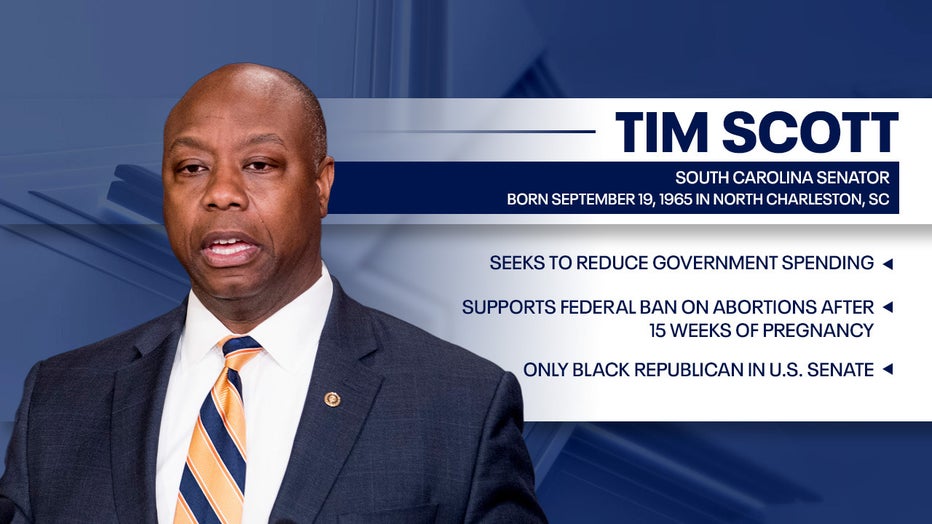
The senator from South Carolina did not have a breakout moment in the first debate in Milwaukee and is hoping to change that during Wednesday’s event.
Wanting to be a bigger part of the conversation, Scott asked the party to change how it orders the candidates onstage in an effort to get more prominent podium placement. There is no indication the RNC plans to do that.
The Associated Press contributed to this report.

